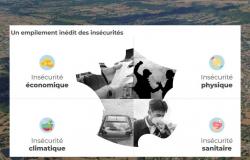One of the most strategic areas for the Paris metropolis in the event of major flooding is certainly one of the most ignored. With the exception of fishing and waterfowl enthusiasts, who knows La Bassée, this expanse of ponds and woods, located on the borders of Seine-et-Marne, an hour and fifteen minutes south-east of Paris , when it runs well? The blue lung of Ile-de-France, they say. An exceptional wetland. A vast alluvial plain from which a large part of the aggregates used in construction sites in the region come. And, since Wednesday January 15, the place where seven pumps forcefully suck water from the Seine to discharge it into a “pilot locker”a rectangle of 360 hectares now surrounded by dikes, upstream of Montereau-Fault-Yonne.
As of Monday, a helicopter began circling above the area. Alarms sounded in the swamps. Then the phones of people approaching the area rang shrilly, displaying an alert message. “extremely serious” : “Formal ban on entering the space surrounded by dikes. » It was necessary to scare off the animals and keep the people away, before the start of the operation: the test watering of a new development in the upstream basin of the Seine to mitigate the flooding of a river whose exceptional overflows are feared. And that global warming promises to accentuate.
Two and a half years of work, much more debate, 114 million euros. This is the fifth structure, all managed by the Seine Grands Lakes Territorial Public Establishment. “And the first heavy equipment built since 1990”, insists Patrick Ollier, president of the public establishment and the Greater Paris Metropolis (123 municipalities), a particularly vulnerable territory. The other four are the reservoir lakes laid in the XXe century on the river and its tributaries. Their mission is twofold: to limit floods (up to 70 centimeters less in Paris), but also to ensure a constant flow during dry periods. Without the lakes, navigation on the Seine in certain summers, such as the cooling of the Nogent nuclear power plant, or the production of drinking water, would be compromised.
-You have 74.63% of this article left to read. The rest is reserved for subscribers.
France






